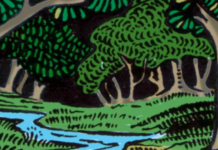 Psychic Self-Defense: The Classic Instruction Manual for Protecting Yourself Against Paranormal Attack, by Dion Fortune
Psychic Self-Defense: The Classic Instruction Manual for Protecting Yourself Against Paranormal Attack, by Dion Fortune
Weiser, 9781578635092, 238pp., 1930, 2001
“This is a warning to the curious: Times, points of view, and fashions change, but never principles.”1 I doubt Dion Fortune knew how true those words would be eighty years after she wrote Psychic Self-Defense. A lot has changed in the world, both the mundane and magickal landscape are drastically different from her time, so much so that it can be hard to see how relevant this book remains today.
The book is divided into four sections. Part I deals with the types of psychic attack, such as witchcraft, vampirism, and when ceremonial magick goes wrong. It also deals with the signs of the attack and analyzing the nature, figuring out what type of attack it is. Part II deals with differential diagnosis or the other things that could be going on. Part III tackles diagnosing the attack in detail, how they are made, and the motives. Lastly, Part IV is what you’d expect from a book with this title, methods of defence.
Part IV deals with a variety of methods, starting off from simple to more complex. The beginner reading this book can learn how to make Holy Water (provided they are Christian), or using garlic to absorb a negative psychic atmosphere. Getting more complex (but more common in this day) you get the Qabalastic Cross and LBRP, as well as creating magickal circles. Finally she touches upon destroying thought forms, and dealing angels, and the “Occult Police.”
Despite the variety of techniques she breaks down for the reader I feel that is of less value to most people than the rest of the text. Going back to the opening quote these are the points of view, and fashions that have changed over time. While it is nice to have them in one section almost all of the techniques she mentions are explained in most modern beginner texts, and in many cases explained better and with less of a Christian bias. Though, as she says, principles never change, and to me that is the value of this book.
Fortune thoroughly admits the occult is real, and that there are people and forces who seek to use it for the ill of others, but she does so in one of the most grounded and rational explorations on the topic I’ve ever seen. Several times she states that psychic phenomena isn’t necessarily bad. “[W]e must not make the mistake of thinking that these invisible forces are necessarily evil and inimical to humanity. They are no more inimical in themselves than are water or fire, but they are potent.”2 “It will be noted that I use the term ‘interference’ and not ‘attack.’ The disturbance need not necessarily be an attack.”3 It may seem obvious to some, but so often I encounter people crying devil and running for the hills because something is happening. Just because you have a ghost, doesn’t mean it’s a demon out to get you. Just because you’re having bad psychic experiences doesn’t mean you’re under attack. The waters of the psychic world aren’t always clear from where we are, and sometimes it is hard to see what currents are at play. Fortune stresses a calm head, and an evaluation of the situation to see if what is occurring is negative, intentional, accidental, or random.
She also walks the line of mental health and psychic disturbance, a tricky line now, and at her time part of a new born field. “The differential diagnosis between hysteria, insanity, and psychic attack is an exceedingly delicate and difficult operation, for so frequently a case is not clear-cut, more than one element being present.”4 It is her balanced consideration of the magickal and mundane without denying either that I believe makes this book relevant. While the text is a product of the times considering how it discusses women and “coloured people” and the “sceptical Latin,”5 and the focus on Christian and Christianized techniques, it does still stand up as a practical text for the principals and philosophy that it upholds. For this reason it is a relevant text, despite all the changes, and a book worthy of perusal and reflection to keep one grounded when dealing with matters of psychic self-defense.








